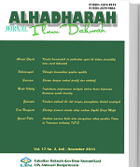SIARAN DENGAN CONTENT POSITIF DAN EDUKATIF
DOI:
https://doi.org/10.18592/alhadharah.v17i34.2379Keywords:
radio broadcasts, radio contentAbstract
This journal addresses the topic of radio and television broadcasts which are mostly filled with dangdut songs and other events which are sometimes not in accordance with religious norms and regulations in the broadcasting sector. This is indicated by the presence of a number of songs that were hit by reprimand, both by the MUI, the KPID and from the sworddut itself. The problem here is what songs have been broadcast by radio / television and then reprimanded by the authorities, and what songs should be the contents of radio or television broadcasts that are positively charged and educative. This journal is indeed a number of songs that have been banned from being broadcast by radio or television, both because of the lyrics / poetry and the erotic movements of the singers which are categorized as containing pornography and porno-action. Songs should be created and broadcast in line with religious values, customs and regulations, without losing their artistic value, including regional songs. Such songs will be eternal, even though the creator or singer is goneReferences
Effendi, Onong Uchjana, 1993. Ilmu, Teori dan Filsafat Komunikasi, Bandung: Citra Aditya Bhakti.
Komisi Penyiaran Indonesia Daerah (KPID) Kalimantan Selatan, Berkas Evaluasi Dengar Pendapat Radio-radio Siaran Swasta Niaga di Kalimantan Selatan, untuk permohonan Perpanjangan Izin Penyelenggaraan Penyiaran, Banjarmasin, Maret 2016.
Kusnawan, Aep, “Tabligh Melalui Radio”, dalam Aep Kusnawan, et al., (1995), Komunikasi Penyiaran Islam, (Bandung: Fakultas Dakwah IAIN Sunan Gunung Jati, 1995).
Kuswandi, Wawan, Komunikasi Massa: Sebuah Analisis Media Radio, (Jakarta: Rineka Cipta, 1996).
Majelis Ulama Indonesia (MUI), 2003. Himpunan Fatwa MUI, Jakarta: MUI & Departemen Agama RI.
Muntaqo, Lutfan, Porno Definisi dan Kontroversi, (Yogyakarta: Jagad Media, 2006).
Nur Arianto, Televisi Sebagai Media Dakwah, google sinetron dakwah, diakses tanggal 11 Februari 2011.
Peraturan KPI Nomor 1/P/KPI/12 Tahun 2009 tentang Pedoman Perilaku Penyiaran dan Stándar Program Siaran (P3SPS).
Sabili, Agustus 2010.
Wahyudi, 1994. Dasar-dasar Manajemen Penyiaran, Jakarta: Gramedia.
Yakan, Muna Haddad, 1990. Hati-hati Terhadap Media yang Merusak Anak, Alih bahasa Salim Basyarahil, Jakarta: Gema Insani Press.
Undang-Undang Nomor 32 Tahun 2002 tentang Penyiaran
Downloads
Published
How to Cite
Issue
Section
License
Authors retain copyright and grant the journal the right of first publication, with the work simultaneously licensed under the Creative Commons Attribution-NonCommercial 4.0 International Public License (CC BY-NC 4.0). This license allows reusers to distribute, remix, adapt, and build upon the material in any medium or format for noncommercial purposes only, provided that proper attribution is given to the original creator.







